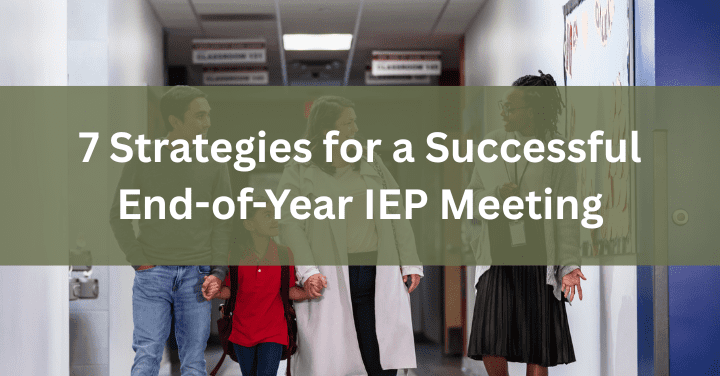For families of students with IEPs (Individualized Education Programs), spring brings more than just warm weather—it signals the approach of important annual meetings. These end-of-year IEP or re-evaluation meetings are your chance to reflect, collaborate, and advocate for your child’s needs moving forward.
If the idea of sitting down with a team of specialists feels intimidating, you’re not alone. But with a little preparation, these meetings can become powerful tools to support your child’s growth and success. Here are seven strategies to help you feel confident and empowered:
1. Come with Questions
Jot down questions ahead of time: How is my child doing academically? What progress have they made? Are social-emotional goals being met? Clarifying your priorities helps ensure nothing important gets overlooked.
2. Show Up Early and Engaged
Respect everyone’s time—especially your own. Arrive a few minutes early, and if the proposed date or time doesn’t work for your schedule, you have the right to request a change.
3. Bring Documentation
Useful materials include your child’s current IEP, progress reports/report cards, relevant work samples, teacher communication, or any recent medical information that may impact learning or accommodations.
4. Align on Goals
Before the meeting, reflect on realistic goals you’d like to see for the upcoming year. Consider what academic, behavioral, or communication skills you hope to prioritize and bring those ideas to the table. Input is always welcome when goal-setting!
5. Ask About Home Strategies
One of the most valuable outcomes of an IEP meeting is learning what’s working at school—and how you can mirror those strategies at home. Consistency at home helps build confidence and reinforces your child’s support system year-round. Afterschool tutoring can be helpful in supporting your child’s academic goals.
6. Follow the Agenda—But Speak Up
There’s a legal and procedural structure to IEP meetings, but that doesn’t mean your voice isn’t central. Let the team lead through the required steps, and speak up when something needs clarification.
If you are feeling unsure about the IEP process, consider consulting a special education advocate. Advocates are certified special education professionals who offer consulting and support to help parents feel empowered, not overwhelmed. Whether you need help preparing for a meeting, interpreting accommodations or understanding your parental rights, an advocate can bring a wealth of knowledge and peace of mind.
7. Recognize the Team’s Work
IEP meetings require a lot of prep from teachers, specialists and administration. A simple thank-you can go a long way in building collaborative, long-term relationships centered on your child’s success. At the end of the day, most education professionals really do have your child’s best interests in mind.
With preparation, perspective, and a little bit of partnership, IEP meetings can become less stressful—and more meaningful—for everyone involved.





